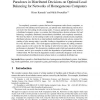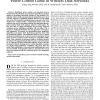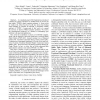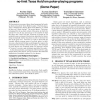28 search results - page 5 / 6 » A technique for reducing normal-form games to compute a Nash... |
PERCOM
2006
ACM
14 years 5 months ago
2006
ACM
A smart home aims at building intelligence automation with a goal to provide its inhabitants with maximum possible comfort, minimize the resource consumption and thus overall cost...
JACM
2002
13 years 5 months ago
2002
In completely symmetric systems that have homogeneous nodes (hosts, computers, or processors) with identical arrival processes, an optimal static load balancing scheme does not in...
TON
2008
13 years 5 months ago
2008
Distributed power control is an important issue in wireless networks. Recently, noncooperative game theory has been applied to investigate interesting solutions to this problem. Th...
FOCS
2009
IEEE
14 years 16 days ago
2009
IEEE
— In a landmark paper [32], Papadimitriou introduced a number of syntactic subclasses of TFNP based on proof styles that (unlike TFNP) admit complete problems. A recent series of...
ATAL
2008
Springer
13 years 7 months ago
2008
Springer
We demonstrate two game theory-based programs for headsup limit and no-limit Texas Hold'em poker. The first player, GS3, is designed for playing limit Texas Hold'em, in ...




